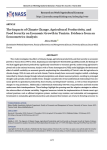Khalifa J. (2025). The impacts of climate change, agricultural productivity, and food security on economic growth in Tunisia: evidence from an econometrics analysis. Research on World Agricultural Economy, 01/03/2025, vol. 6, n. 1, p. 577-599.
https://doi.org/10.36956/rwae.v6i1.1457
https://doi.org/10.36956/rwae.v6i1.1457
| Titre : | The impacts of climate change, agricultural productivity, and food security on economic growth in Tunisia: evidence from an econometrics analysis (2025) |
| Auteurs : | J. Khalifa |
| Type de document : | Article |
| Dans : | Research on World Agricultural Economy (vol. 6, n. 1, March 2025) |
| Article en page(s) : | p. 577-599 |
| Langues : | Anglais |
| Langues du résumé : | Anglais |
| Catégories : |
Catégories principales 03 - POLITIQUE ET THEORIE ECONOMIQUE ; 3.3 - Politique et Situation EconomiquesThésaurus IAMM CROISSANCE ECONOMIQUE ; EVALUATION DE L'IMPACT ; CHANGEMENT CLIMATIQUE ; RENDEMENT DES CULTURES ; PRODUCTIVITE ; SECURITE ALIMENTAIRE ; ANALYSE ECONOMIQUE ; MODELE ECONOMETRIQUE ; TUNISIE |
| Résumé : | This study investigates the effects of climate change, agricultural productivity, and food security on economic growth in Tunisia from 1990 to 2022. Employing an Autoregressive Distributed Lag (ARDL) model, the findings re- veal that lagged agricultural productivity significantly contributes to economic growth, underscoring agriculture's pivotal role in the national economy. Analysis with a Vector Autoregressive (VAR) model highlights the detrimental effect of rainfall variability on economic growth, emphasizing the vulnerability of Tunisia's rain-fed agriculture to climate change. With its semi-arid and arid climate, Tunisia already faces scarce and irregular rainfall, a challenge intensified by climate change through reduced precipitation and altered seasonal patterns, resulting in prolonged droughts and sporadic, intense rainfall events. Granger causality tests reveal unidirectional relationships from eco- nomic growth to agricultural productivity, food security, and temperature variation, as well as from temperature changes to crop production. Additionally, a bidirectional relationship between crop production and food security underscores their interdependence. These findings highlight the pressing need for adaptive strategies to address the adverse effects of climate variability. Suggested measures include the implementation of climate-smart agricultural practices, such as efficient irrigation systems, resilient crop varieties, and sustainable soil management. Investments in sustainable agricultural practices and enhanced food systems are crucial to fostering economic resilience and stability. This study offers valuable insights into the interplay between climate change, agriculture, and economic growth, contributing to the broader discourse on sustainable development and providing actionable pol- icy recommendations to fortify Tunisia's agricultural and economic systems against escalating climate challenges. |
| Cote : | En ligne |
| URL / DOI : | https://doi.org/10.36956/rwae.v6i1.1457 |







